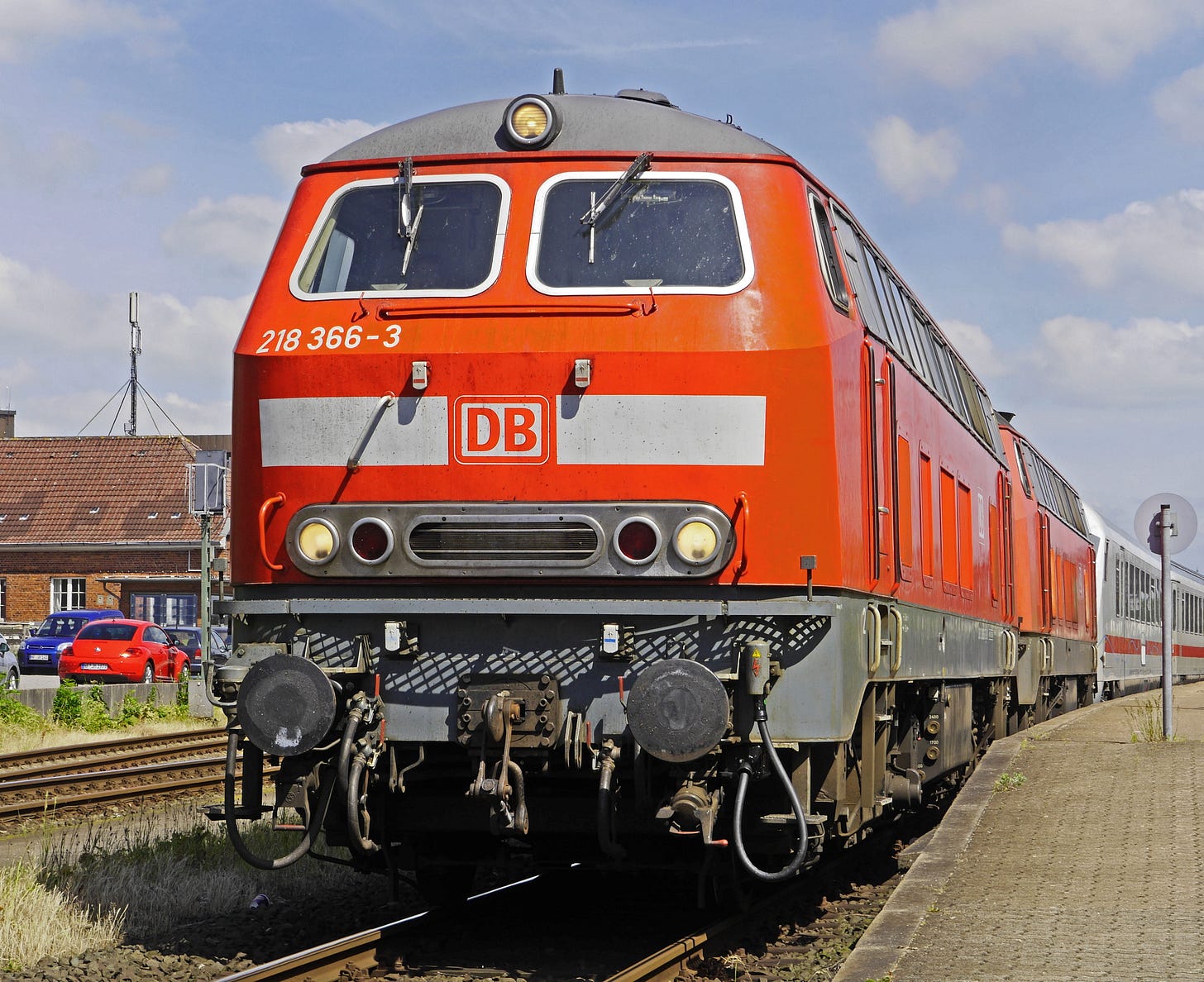A €6 billion train wreck, Merkel the pirate, and unusual heroes
This newsletter is a 4-minute read
Dear reader,
Today we’re talking Deutsche Bahn, tussles on the high seas, and odd far-right heroes.
Best,
Jörg & Axel
Forward this newsletter to your friends - we rely on you to grow
1. The €6 billion train wreck
Richard Lutz, CEO of Deutsche Bahn, is probably not looking forward to the 9th of December. The year’s end forecast he’ll have to present to his board of directors and owners, the German state, has already leaked to the press and make painful reading. Mr Lutz is blaming Corona for the whopping €6 billion loss that his trains will burden the taxpayer with. But that’s not the whole truth - Germany's state railway has always been a train wreck (no pun intended…). The company is €30 billion in the red, meaning it’s paying interest rather than modernizing its archaic infrastructure.
The company is chronically mismanaged; top management consists of Deutsche Bahn-lifers or semi-retired politicians such as CDU-man Ronald Pofalla, rather than the cadre of top businesswomen and businessmen that a transportation company with revenues of close to €50 billion requires. The one exception was former CFO Alexander Doll, but the seasoned investment banker was sacked after less than two years, after he lost a power tussle with Richard Lutz, Roland Pofalla, and the federal minister of transport, Andreas Scheuer.
The way things are looking, German taxpayers will have to continue to plug the billion-euro deficits of their state railway for years to come...
2. ‘Pirates’ on the high seas
Last Sunday, Bundeswehr soldiers boarded a Turkish freight carrier in the Mediterranean en route to Libya due to a suspicion that it was smuggling arms. But the Germans were promptly asked to return to their warship, the Hamburg, because Turkey refused to let the cargo be inspected. The Hamburg is part of the EU’s mission to enforce the arms embargo against Libya. Erdogan himself intervened and claimed that the Bundeswehr had harassed the crew of the carrier, which he said was carrying aid and not arms. The Turkish media called Angela Merkel a pirate, while the head of the EU’s mission in Ankara was called into the foreign ministry for a ticking off.
It’s hard to keep up with who is on who's side in the many proxy-wars of the Middle East, but, in theory at least, Turkey and the EU both back the same guy - the leader of Libya's UN-backed government, Fayez al-Sarraj.
3. Gig-economy under fire
Food delivery company Lieferando (part of the Takeaway.com group) is one of the few businesses that is actually benefiting from the lockdown. After competitors Foodora and Deliveroo pulled out of Germany last year, the Dutch company has a de-facto monopoly in many cities. With California passing the controversial (and heavily lobbied) proposition 22 that allows gig-economy companies such as Uber or GrubHub to engage their drivers and couriers as freelancers - thus denying them the same benefits that employees have - a debate on workers’ rights has been given new impetus in Germany. A 23-year old Lieferando courier organized a workers’ council and this week presented a 52-point list of breaches against occupational health and safety, such as no access to toilets while working.
To make matters worse, a Lieferando rider was killed in a tragic car-accident in Frankfurt last weekend.
Occupational safety and workers’ rights are supposedly big topics in Germany, but lawmakers have done a pretty good job of ignoring them in slaughter houses and logistics for years...…
4. We’ve all become (bad) mathematicians
The corona pandemic has brought any amount of scientific and mathematical jargon into common parlance. Suddenly, everyone potentially has superpowers lurking inside them. Who are these mysterious “superspreaders” though? Well, rather boringly, they’re just people who sneeze a lot (and have a full set of teeth).
Another stock phrase that has been doing the rounds is “exponential growth.” In justifying an extension of the lockdown on Thursday, Angela Merkel said that the new restrictions “have broken the exponential growth.” Growth of the exponential variety sounds pretty terrifying, but what exactly is it? We asked the Robert Koch Institute when, and for how long, this exponential spread had happened. They gave us the following reply:
"In principle, an R-number [rate of reproduction] above 1 indicates exponential growth, but then of course the doubling time must happen at least once before you can check whether the numbers have really doubled and what the average doubling time (and thus an average R-number) was afterwards. Both at the beginning of the first wave and at the beginning of the second wave there was this exponential increase in the number of new cases - but what the exact numbers are and over what period of time exactly an exponential growth took place has not yet been evaluated.”
This is a pretty wish-washy reply.
So any R-number above one indicates "exponential growth." Given that an R-number of one indicates no growth, does that mean growth and exponential growth are essentially being used interchangeably? At any rate, the very large but in their reply seems to muddy waters around whether Merkel is using the phrase because it has descriptive value or merely because it sounds scary.
5. The far-right’s use of anti-Nazis as heroes
There has been a lot of comment in the German press this week concerning two incidents at anti-lockdown rallies in which young people have compared themselves to teenagers persecuted by the Nazis. At a demonstration in Hannover, a 22-year-old student who is now know countrywide as “Jana from Kassel” compared herself to Sophie Scholl, a student who was executed in 1943 for distributing anti-Nazi fliers. Video of the incident went viral on social media. At a demo in Karlsruhe a week earlier an 11-year-old girl compared herself to Anne Frank due to the fact that she couldn’t celebrate her birthday.
We don’t need to point out here the absurdity of such comparisons. But a couple of things stand out. The Twitter tirade against Jana from Kassel has gone global, with English-language users deploying the worst expletives in the book to condemn her - is that the response of a civilized society? Secondly, newspapers have repeatedly reported that the far-right deliberately use Nazi victims to promote their agenda. This oddity is given surprisingly little attention. A political movement can’t just pick and choose its heroes and villains as it sees fit. A movement that encourages its younger members to see themselves as following in the footsteps of Sophie Scholl by implication must admit the justness of her actions. Amid all the hysteria over Jana from Kassel’s unfortunate comparison, that peculiar fact seems to have been missed.
Like what you’re reading? German current affairs and news straight to your inbox three times a week. Subscribe here to get the Hochhaus newsletter:
Who we are:
Jörg Luyken: Journalist based in Berlin since 2014. His work has been published by German and English outlets including der Spiegel, die Welt, the Daily Telegraph and the Times. Formerly in the Middle East.
Axel Bard Bringéus: Started his career as a journalist for the leading Swedish daily Svenska Dagbladet and has spent the last decade in senior roles at Spotify and as a venture capital investor. In Berlin since 2011.







